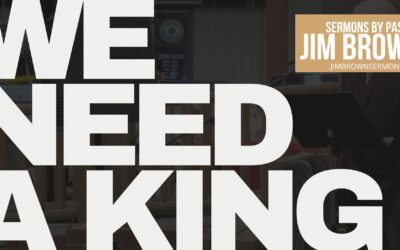November 20, 2024
EP 3: FAITH THAT PLEASES GOD | LEARNING TO WALK BY FAITH
Hebrews 11:6
Discover How Biblical Faith Guides Us in Trusting God In difficult times
Are you ready to experience a Faith That Pleases God? Dive into the power of Biblical Faith and the journey of Walking by Faith—a path that reshapes how we see challenges, strengthens our hope, and shows us how to trust in God’s timing even in the hardest moments. This message unpacks what true faith looks like, from everyday trust to the unshakeable, mountain-moving kind of faith. Don’t miss this inspiring sermon that brings us back to the heart of faith and obedienceand reveals how living by faith can transform your walk with God.
Sermon Study Resources
Sermon Notes
Your Subtitle Goes Here
Sermon Title: Faith That Pleases God
Introduction
- Opening Thought: Serving the Lord requires strong faith and complete trust in Him.
- Goal of the Message: Examine the type of faith that pleases God.
1. Everyday Faith in Practice
- Illustration with Chair: We place faith in everyday things, such as trusting that a chair will hold us.
- Question: What are we putting our faith in daily?
2. Key Scripture: Hebrews 11:6
- “And without faith, it is impossible to please God, because anyone who comes to him must believe that he exists and that he rewards those who earnestly seek him.”
- Central Idea: Faith is the foundation of a life that pleases God.
3. Examples from the “Faith Hall of Fame” (Hebrews 11)
- Biblical Figures Mentioned: Abel, Enoch, Noah, Abraham, Jacob, Joseph.
- Reflection: Their lives were different from ours, but they shared a common faith that pleased God.
4. Belief Beyond Existence
- Early Christians were known as “believers” for their distinct faith.
- Key Point: True faith isn’t just believing that God exists; it’s trusting His nature and promises.
5. Historical Note: The Apostles’ Creed
- Background: The Apostles’ Creed summarizes foundational Christian beliefs, dating back to around A.D. 340.
- Reflection: Reciting creeds is not enough—faith must move from words to actions.
6. Faith as a Verb
- Key Point: Faith is rarely a noun in the Bible; it’s more often an action (verb).
- Challenge: Ask if your faith is something active and alive, not just a concept.
7. Faith Involves Risk
- Quote: “Unless there’s an element of risk in your journey with God, there’s no real need for faith.”
- Illustration: Hudson Taylor’s choice to rely solely on God for his needs, avoiding conventional support.
- Reflection: Faith often means trusting God over what feels secure or familiar.
8. Psalm 112:7
- “They do not fear bad news. They confidently trust the Lord to care for them.”
- Insight: A heart that trusts God remains unshaken, even in difficult times.
9. Biblical Trust over Conventional Means
- James 1:5-8: “But if any of you lacks wisdom, let him ask of God, who gives to all generously and without reproach, and it will be given to him. But he must ask in faith without any doubting, for the one who doubts is like the surf of the sea, driven and tossed by the wind. For that man ought not to expect that he will receive anything from the Lord, being a double-minded man, unstable in all his ways.”
- Key Point: Faith sometimes calls us to rely on God directly, beyond our usual resources or solutions.
- Reflection: Where do we turn first when we face challenges—our own means or God?
10. Growth in Faith Through Challenges
- Concept of Assumptions: Faith challenges us to reexamine the assumptions we live by.
- 2 Peter 1:5: “Now for this very reason also, applying all diligence, in your faith supply moral excellence, and in your moral excellence, knowledge.”
- Crisis of Belief: When our assumptions are tested, we grow by adjusting our lives according to God’s guidance.
11. Resting Faith
- Hebrews 11:1: “Now faith is the assurance of things hoped for, the conviction of things not seen.”
- Key Thought: True faith provides a deep, resting confidence in God’s promises and presence.
12. Trust and God’s Sovereignty
- Romans 12:2: “And do not be conformed to this world, but be transformed by the renewing of your mind, so that you may prove what the will of God is, that which is good and acceptable and perfect.”
- Reflection: Faith involves renewing our mind and aligning our lives with God’s will, rather than conforming to worldly patterns.
13. The Process of Growing in Faith
- Steps in Faith Development:
- Discovering the Truth: Understanding who God is.
- Experiencing the Truth: Living out our faith actively.
- Assimilating the Truth: Faith becomes a natural part of who we are.
14. Living by Faith Instead of by Sight
- Quote: “Confidence in the Lord is believing in such a manner that what we believe about God is an unshakable fact that changes the way we think and adjust our lives around it.”
- Challenge: True faith makes us different from the world, pointing to God.
Conclusion
- Key Choice: Faith that pleases God is a decision between living by faith or by the comforts and securities of this world.
- Encouragement: Trust God, risk stepping into deeper faith, and live with an eternal perspective.
Bible Verses
Your Subtitle Goes Here
Hebrews 11:6 (NIV)
“And without faith, it is impossible to please God, because anyone who comes to him must believe that he exists and that he rewards those who earnestly seek him.”
Psalm 112:7 (NLT)
“They do not fear bad news. They confidently trust the Lord to care for them.”
James 1:5-8 (NASB-1995)
“But if any of you lacks wisdom, let him ask of God, who gives to all generously and without reproach, and it will be given to him. But he must ask in faith without any doubting, for the one who doubts is like the surf of the sea, driven and tossed by the wind. For that man ought not to expect that he will receive anything from the Lord, being a double-minded man, unstable in all his ways.”
John 1:12 (NLT)
“But to all who believed him and accepted him, he gave the right to become children of God.”
2 Peter 1:5 (NASB-1995)
“Now for this very reason also, applying all diligence, in your faith supply moral excellence, and in your moral excellence, knowledge.”
Hebrews 11:1 (NASB-1995)
“Now faith is the assurance of things hoped for, the conviction of things not seen.”
Romans 12:2 (NASB-1995)
“And do not be conformed to this world, but be transformed by the renewing of your mind, so that you may prove what the will of God is, that which is good and acceptable and perfect.”
Sermon Slides
Your Subtitle Goes Here







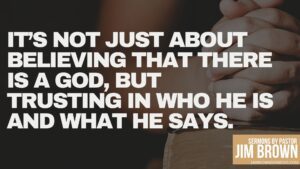
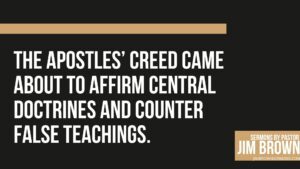





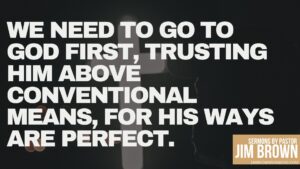







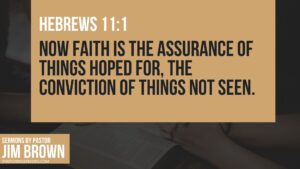

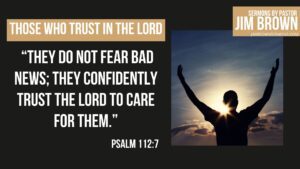


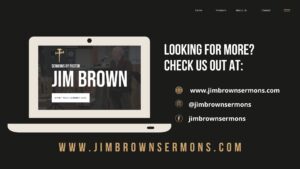
Related Song List
Your Subtitle Goes Here
Sermon Transcript
Your Subtitle Goes Here
Faith That Pleases God: Learning To Walk By Faith
It’s going to take a lot of faith to serve the Lord. We need to trust Him in every way. Today, we’re going to be looking at faith and what kind of faith it is that pleases God. And today, I’m going to try to rock your faith. Do you think I can do it? Sure. Okay. Well, we’ll see. But before I do it, I have this chair here. I forgot it’s been up here to remind me that I need to make an announcement from our manufacturer that they were saying that they didn’t necessarily have their welders set up. Although the welds have turned out right on some chairs, they look good but don’t necessarily hold up. And what happens is back here, this bar breaks, and as people sit down, it kind of folds in, and you kind of get stuck in there with your legs sticking up. Just a warning. Okay, so check out the chairs. We’re all attached together now, so you can’t really look at them, and really, you can’t see it. Pardon? When does this happen? All at once. The whole group.
So, how do you feel about the chair you’re sitting in right now? No? But it’s the simple things we put faith into, right? Especially people standing up here telling you about chairs. You believe me, right? But every day, we live by faith in something, right? We trust something. We trust somebody. Every day is a walk of faith. The question is, what are we putting our faith in? That’s what we need to ask ourselves continually. This was an email I got that said, why women live longer than men. Any takers? Yeah.
Okay, we’re going to be looking at Hebrews 11:6. It states without faith, it’s impossible to please God. This statement is central to our Christian experience. Everything revolves around it because, as Christians, we should be living a life that pleases God. We find that verse tucked into what’s often called the Faith Hall of Fame. Actually, today’s message could have been called The Faith of Our Fathers. There’s Abel, Enoch, Noah, Abraham, Jacob, Joseph, and the list goes on of all those who have gone in before us and who had faith that pleased God. There were a lot of those who were even unnamed that went on before us, but they all had one thing in common. They had the faith that pleases God. So what is it? How can I get it? Well, looking at the lives of those people that were mentioned there that have gone on before us in faith can be a real mystery if we try to look at their behavior or copy that or their lifestyle because they lived very different lives than we did.
They had very different opportunities in life than we have. So how can we live like they did but have these very different experiences? What is that faith that pleases God? The next part of the verse will help, and it says in verse six of Hebrews 11, “So you see it is impossible to please God without faith.” Anyone who wants to come to him must believe that there is a God and that he rewards those who sincerely seek Him. So, believing in God, do you think that’s it? Is that the trick to it? We’ve got to believe that there is a God. That’s what it says. In fact, in the earliest days, believers were called believers. Why? Because they believed something different. Christians were known as believers because they believed something different than other people did. They believed in the Almighty God.
But what we believe about God is also very important, not just that we believe that there is a God, but what is it that we believe about him? Throughout Christian history, we have statements of faith, and we have one at Valley community. We often have it on the table out there. It covers things like the Bible, what we believe about the Bible, God, Jesus, the Holy Spirit, mankind, the church, Satan, and the future. These are all important things for us to understand and to state what we believe in. But is that all there is to it? Well, as you look through history, there’s been all kinds of statements of faith. One of the oldest ones is called the Apostles Creed. We’re probably mostly familiar with that. It came about in the year ad three 40, and it was an effort to put out the central doctrines of the faith and to kind of disprove any false teachings.
Legend has it that each one of the apostles had contributed some part of that. We don’t know if that’s true, but you can definitely see that their fingerprints are all over this thing. So, in the early days, it was called the rule of faith, not the apostle’s creed, but the rule of faith. So let’s read it together. We’re going to have it up here. I believe in God, the Father Almighty, maker of heaven and earth, and in Jesus Christ, his only begotten son, our Lord, who was conceived by the Holy Spirit, born of the Virgin Mary, suffered under Pontius Pilate, was crucified, dead, and buried. He had descended into hell. On the third day, he rose again from the dead. He descended into heaven and sits at the right hand of God, the Father Almighty. He shall come to judge the living and the dead. I believe in the Holy Spirit, the Holy Christian Church, the communion, saints, forgiveness of sins, and the resurrection of the body in life everlasting. Amen.
So, do you believe all that? Yes. Okay, well, that’s all it takes to please God. Is that right? We stated our faith. Now that we have faith in God, we state what it is because, without faith, it’s impossible to please God. So, did we just prove that we have faith by stating what we believe? Can we be sure that this is enough? See, there are other variations or expressions of our faith that also need to be stated. I’ve heard it said that if you can precisely define your faith, then it can’t really be faith because there’s something about faith in God that we can’t understand. There’s something we can’t connect. Francis of Assisi used to say that, go and preach the gospel. Share your faith, and if you must use words, he was saying there’s an aspect to sharing faith, to having faith that just cannot be described.
Well, I think we’ll find that we drive ourselves nuts if we try to define our faith, look to doctrines, and try to live those out. We just never seem to have enough. It just seems to be something we’re chasing after over and over again. It also might help to look at the word faith from the biblical perspective and see what ways the Bible uses the term. The first one is that there are other words that also are translated from faith. It’s the word believe and the word trust. Now, we’ve talked about the word believe already in terms of what it is we believe, but trust that goes a little deeper. See, trusting something means that you’re putting forth effort and belief in something that maybe you just don’t know everything about. So there’s an extra step there. You just don’t have all the ducks in a row on this one. So you step out, and you’ve got to trust. So trust involves risk, and that’s an important concept to remember, that when we trust, it involves a risk. Because if there’s no risk involved, we don’t really need to be trusting.
We all trust these chairs. Now, you might say, well, there’s not much risk there, but I bet you now next time you sit down, something’s going to go through your head a little bit and say, oh, maybe this chair will collapse. And if you’ve ever had a chair collapse on you, then maybe you won’t trust every chair quite the same. So there’s always an element of risk and faith, especially faith in God because we can’t know everything there is to know about God. And so there’s always that unknown out there. It also helps to see how the word is used as a noun or a verb in scripture as a noun. It would be a person, place, thing, or idea. That’s how we just looked at it in the Apostles’ Creed. But then there’s also looking at it as a verb, an action word.
The Greek word faith is rarely used as a noun. It’s about a 10-to-1 ratio. They say that it’s used as a verb, which is its action. It describes the actions of men and women putting their trust and putting their faith in Jesus. That’s how it’s primarily used throughout the New Testament. So you’ve got to ask myself, do I usually look at my faith as a noun, or am I looking at it as a verb? Somebody looking at my life, how would they see my faith? Would they see it expressed in action or only in ideas? And what does that action look like if it’s going to be expressed in action? What does it mean to trust in Jesus? Do I trust Jesus? Those are the questions we need to ask for this faith that pleases God to know whether or not we really have it.
Do we trust Jesus when it comes to the outcome of a certain event that we’re getting involved in or a decision we have to make? See, biblical faith can often be described as trusting God rather than trusting conventional means for something you need trusting God rather than trusting conventional means for something you need. Now, that doesn’t mean that there’s something wrong with conventional means. I’m not saying that, but oftentimes, God will want to remove one aspect of the conventional means of getting our needs met in order for us to look to him. For example, we could say that in Hudson Taylor’s time, he was a great saint who had gone before us. Many of us know about him that in his days in the mid-1850s, for him to take money from his parents or from the mission to go to college to go to medical school, it would’ve been normal for the family to support him in that effort and they wanted to, but he denied that support, wanting to trust God solely for his support and his medical school bills, and God met his needs. There was risk involved, there was risk of all sorts. Think about the risks that you would face in a situation like that.
See, other Christians and circumstances might be used in our daily lives, and that’s okay, but that’s not necessarily the way God wants to always work. There’s always this element of tension of risk. So unless there’s an element of risk in your journey with God, there’s no need for faith. We talked about that in the men’s group on Saturday morning. Unless there’s an element of risk in your journey with God, there’s no real need for faith. So you can see the conflict here. Now, okay, what’s the risk? And do I have to go out looking for risks in order to please God? No. I think what it is is we have to face the risks when they arrive. I’m not saying that there’s anything wrong with the conventional means. I want to clarify that. However, as an act of faith, God may ask you to trust him alone for the outcome and the procedures to follow.
Sometimes, the distinction between trusting God and trusting conventional means the distinction can be very subtle, and you don’t really know, well, am I really trusting my bank account, or am I trusting God who told me to take the money out of my bank account? These are things we wrestle with, but as we grow closer in our walk with God, we understand and hear his voice more clearly. The real question is, what is our first choice? Where do we go first when we need to make a decision? When there’s a choice to be made, where do we go? Do we go first to God or first go to conventional means? If we go to God, we take a risk that he may not use the conventional means to meet that need. So oftentimes, we don’t even want to go there; we just want to do it our way, do what we want to do.
Oftentimes, we ask, when we have to make a choice, how will this benefit me? Well, if that question pops into our head first and how we’re going to get that need met, well then probably God’s going to be working on our priorities and our assumptions and those things that are underlining our decision-making process. For example, when we first started out in ministry, we were in a small group, and that group was very helpful support for us. God really led us that we would be taking steps of faith through this process, and throughout my life, I knew how to work. My dad taught me one thing, and that’s how to work. Ever since I can remember, he could see I wasn’t too bright. So he said, this kid’s got to do something else here. So, he taught me how to work. He brought me to his factory with him.
He got me jobs with the milkman, anything he could do to see that I was working from about the age of 10; I knew how to work, and I knew how to make money. Well, when God called us into this ministry, he made it clear that I was no longer to use that means for support. I still needed to work. I still needed to use my hands and do whatever I could, but not for the sake of earning money. I even tested it on him a couple of times, and anything I tried to work on for finances really went wrong. I just messed them all up. Things that were simple to me I couldn’t do. So I believed God, and I wouldn’t do that. So we began to pray about our support, and we sent out letters to everybody we knew, just telling them the new situation we were in and that if they chose to support us, that would be great.
And that’s where it ended. That was where God said, no more, and I’ll supply from here on. And it made us fairly nervous. And about six months into this, we got a tax bill that we weren’t expecting because we had drawn off of our not drawn off, used up our retirement account, and different things like that to get involved in ministry. We had nothing left, and this bill comes for $2,000, and we’re like, oh man, we don’t have anything to pay this bill with. And so we began to write a letter to all those people. We knew that it would possibly help us through this situation. And it was a good letter. It was like one of those Dr. Dobson letters, just a real genuine need being portrayed, one that you would want to give to. And we brought the letter to our small group and said, what do you think of it? And they said, oh, it looks great, looks good. But Germaine was in the group at the time, and she said, yeah, it looks good, but we’ve just seen God working and moving in your life through faith and prayer. I don’t think you should send it easy for you to say.
But we took that, and we said, you’re right. We didn’t go to God first. We went to the typewriter first, then the computer, and got this letter out. So we put the letter aside, got rid of it, and said, okay, Lord, we ask you to meet this need or do what you need to do here. Wouldn’t you know, through the closing of our house, there were some mistakes made, and a couple of days later, a $2,000 check came in to pay for the bill, and to see how God works is amazing. But there’s an element of risk, and trusting God isn’t there. There always is. See, my degree of faith has little to do with the ultimate source because I could have sent that letter out and three days later still gotten that refund through the closing of our house. But the idea is we need to go to God and say, Lord, I’m trusting you now.
How would you like me to proceed? And he may say, write a letter. He may say, just wait, it’s coming. We don’t know, but he does. So it’s a matter of trusting God, who knows the future. So it’s a matter of whether or not we turn first to God, and the risk isn’t always obvious in a step of faith either. Sometimes, it’s just there below the surface, but there’s always an element of risk in that He will not allow us to use conventional means for getting our needs met. That’s what faith in God is all about. It’s different than putting faith in those things that we can see in touch. Living by faith doesn’t always result in an easy way out, either. It doesn’t result in quick answers to prayer. You may need to be careful that you don’t try to rearrange circumstances in order to make it look like God’s working so that you can get on with things and take these different random events and pile ’em up and say, see what God did.
No, we need to wait on God or maybe legalistically look into his words trying to find, okay, he says, I can do this, I can do that, and I can do that, so I’ll go and do it. Now, we don’t just look into his word for the answer; we listen for the answer so that he can direct us. Faith is trusting God for an outcome even when it incurs personal risk, which could otherwise be avoided. Learning to trust God is the primary purpose of our life here on earth. The primary purpose we’re here is to learn to trust God rather than ourselves. See, our eternal life is the greatest security that we have, and if we put confidence in the fact that we are a child of God, he will meet all our needs according to his riches and glory. If we put all our confidence in that with the same boldness that we put confidence in ourselves and our own means, we would never struggle when we go through those dark valleys; we would go through those valleys with peace.
That would make ’em easier, but we would know that God goes through them with us to put our confidence in him. You see, Don talked about assumptions last week. That’s really what drives our lack of faith, our assumptions, the way we think things should go, good health, long life, comfort, financial security, happiness, family happiness, all these different things, successful ministry. These are all our assumptions. They’re not God’s assumptions. The prophet Isaiah was the one God laid on my heart a long time ago to be my model in ministry, and that’s where God says in Isaiah six, who will go for me? And Isaiah said, well, I’ll go. Here I am, send me, and that’s what the heart I wanted, and that’s the heart that I answered God with. But shortly after that, he said, read the rest of it, and he said, go, yes, I’m sending you to chase all the people away to preach until there’s nobody left to preach to look like an utter failure in the eyes of the world.
Do you know what Isaiah’s response was? How long do I have to do this for, Lord? You see, are we willing to take the risk regardless of the outcome just because God’s told us to do it? That’s what faith is all about. One who is resting in our Father’s perfect provision is free from destructive anxiety. I clarify that destructive anxiety there is anxiety in following the Lord. Jesus had anxiety, he showed it in the garden and following the Father’s will, but the destructive anxiety we don’t have to be a part of. Rest is found in the unshakable belief in God’s sovereignty. God is sovereign in James 1:5-8, which says, “But if any of you lacks wisdom, let ask of God who gives to all generously and without reproach and it will be given to him, but he must ask in faith without any doubting for the one who doubts is like the surf of the sea, driven and tossed by the wind. For that man ought not to expect that he will receive anything from the Lord, being double-minded and unstable in all his ways.”
Our faith will be tested when God calls us into ministry; it was tested several times whether or not that was truly his calling. But we need to go back to what God has revealed in the light in those times of darkness and realize that he is true to his word. Just like with the chair, there are all kinds of lies, assumptions, presumptions, ignorance, different things that are barriers that keep us from living a life of faith that God wants the life of faith that pleases God. So what you believe about this chair, whether it’s a lie or the truth you’ll be acting upon, or what you believe about your relationship with God and his provision for you, will guide your decision-making process. And if you truly believe what God says, then you’ll have his sense of peace.
The process of finding out God’s perfect will for you and walking by faith involves three very important steps. The first one is that we discover the truth and what the truth really is about this chair that we’re sitting in or this God that we’re resting in. What is the truth? And then it’s a matter of experiencing that truth. Okay, I believe this chair will hold me that I’ve been told a lie, but I’m still not going to sit in. It is that faith that apostles creed. If you really believe in God, the Father Almighty, if you really believe that’s true, you’ll trust that God, the Father Almighty, in every circumstance in your life, won’t you and that nothing will come into your life that hasn’t passed through his hands.
And then there’s assimilating the truth. Oftentimes, we don’t ever get to that. So, in discovering the truth, we’ve got God, who is great. He is wonderful. Aren’t you glad your God is bigger than any situation you could face? Your identity in Christ is his child. John 1:12 says, but to all who believe in him and accept him, he gave the right to become children of God, and we’ve got a sense of purpose in that. The greatest thing we can do in this life is to build on our relationship with the Father to get closer to him. That is the greatest thing we can do. Everything else comes after that is to learn to trust him more. So we can’t believe in something we don’t know anything about. We can’t trust in something we don’t know, so we need to discover the truth, which is Jesus Christ and we need to learn to be a student of him personally.
It’ll be self-defeating to ask God for wisdom and feel that we’ve gotten some sort of direction from him on something that’s scripturally out of his will. Ignorance of his word leaves us just guessing and living according to what our assumptions drive us to do. We say things like, well, God wants me to be happy. We won’t find that in scripture, but it sure sounds good, and so we have this assumption, we begin to build our life upon it, and we end up in some self-destructive pattern and then doubting God and wondering where he is at God will cap off our learning, our ability to learn. Oftentimes, I speak to people who say, I read the Bible, and I just don’t get anything out of it. I can’t hear it. It just seems like words on a page to me, I believe God caps off our understanding sometimes to the point where if he’s asked us to take a step of faith and we haven’t taken it, we’re going to have trouble going on until we reach that point until we take the step he’s already asked us to do.
We all live on these presumptions or these assumptions in life. There are notions that we believe we go through in life, looking for all this evidence to support. Prejudice is when we believe something about a certain people group, and so we go on through life trying to prove what’s wrong with that people group. We’ll do that. People do it with dating. Well, I know God says I shouldn’t date a nonbeliever, but I know I can win them over, and so we look for evidence to see that this person’s heart is softening towards God and whatever we can do to build on this relationship. My dad even had it with oil changes in his car. My dad took good care of all his stuff, but he hated to change oil. I never knew what the problem was, and he always worked to build his case.
Why you shouldn’t change oil in a car? Well, Herb’s engine blew up, and he changed the oil every other week, so those types of things, he’d always be looking for this evidence, and we can do that. We can look for evidence to prove anything we want. The question is, are we willing to walk by faith and allow God to challenge our assumptions and to change our assumptions? If you look hard enough and long enough, you can prove anything you want to do, but until the Almighty God is allowed into the realm of our assumptions, we will never experience closeness with him. The Bible will be nothing more than words on a page. We need to allow him to invade this area of our life, and it can be terrifying because we may find out that all that we’ve counted on in life, all that we’ve built our life upon, is a lie or, at best, maybe a defense mechanism at that point.
Studying the Bible can actually become a disservice because all it does is build our intellect about God. It builds our theology in some technical manner. Although the Bible has all kinds of practical insights on how to live and principles to live by, we’ve missed the point. If we come away from a time with God only having a better defined him and how he works without really hearing his voice, we are called to the Word to find God, not about God, to find him there, and in doing so, we’ll trust him more. When we understand who he really is, how much he really cares, and how close he really wants to be to us, ask yourself, am I willing to trust God even if it means I’ve got to change my thinking about my core values, about my emotional safety? Am I willing to trust God when it comes to financial security or a need for love?
See, this is the area God wants us to come to him with. Then, we move on to experiencing the truth, challenging our assumptions. That’s what’s happening at this time, our assumptions. We’ve opened them up, and they’re coming to the surface. Henry Blackaby calls this the crisis of belief. That’s where we’re saying, Lord, what’s going on here? Then, we make an adjustment in our lives according to what God says. That’s a very important part of seeing this assumption be challenged, this lie, be challenged, whatever we’ve built our life on, be challenged, and then adjust our life accordingly. Then, we’ve opened the door to our private world. It’s like saying, Lord, why do you want me to be the lead pastor at Valley Community Church when everything with Living Free Ministries is going so well, our financial support is good, and the ministry is growing and spreading throughout the Pacific Northwest? It’s time to move. I had an assumption that God only moves people when things are bad.
No, he moves us whenever he wants us to move. It’s a leadership issue. Who’s in charge? Where do we get our sense of value from what we’re doing or from who we are as his child? This is where our assumptions come under fire, so we often define faithful as doing the same thing over and over and over again without change. I know a lady who said, I know God is going to bless me, and I’m going to win the lottery. I said, how do you know? She says, because I’m faithful. God called me to be faithful in the little things. I buy a ticket every week, and I never miss it. I’m faithful, so God will bless me, but you need to understand this God in whom you’re putting your faith, don’t you? Only God fits the description of doing the same thing over and over and over again without change. We must change. If we’re going to live by faith, we’ve got to change things within our core value system, and those assumptions that we hold onto about life and the way life should be have got to change when we make the decision to trust God regardless of the outcome. At that point, we’re acting in faith.
We’re walking in it. The other direction is mediocrity. If we don’t take that step and act upon what God’s shown us and trust him in it, we won’t complete the circle. We’ll just head off into a land of mediocrity, and a lot of Christians are there. Otherwise, we can complete going right on through. In 2 Peter 1:3, it says that we need to apply all diligence in our faith, all diligence in our faith, and then we won’t be struggling with immorality and behavioral changes and victory. As you read through 2 Peter there, all those things are built upon being diligent in our faith. Oftentimes, we struggle with sin in our lives, but we’re not walking in faith, and we’re trying to deal with the sin without first dealing with the faith issue. That’s got to come first. When Jesus died on the cross for my sins, he did it to save me from the consequences of a value system that idolizes things like wealth, physical attractiveness, deceitfulness, unfaithfulness, and all those things that the flesh craves. If we allow the flesh to continue to give guidance to our lives, we will not walk by faith. Ask yourself, am I willing to change the pattern of my life, my values, my image? Am I willing to give up my self-image for God to change?
Am I willing to risk loss and take a step backward? In the world’s eyes, it is the protection of my lifestyle, keeping me from experiencing a rich relationship with God and walking by faith. And if you take that step, then you go into an area very few people really experience often, and that is assimilating the truth. I call this resting faith. This is when we come to the same conclusion as Peter did when Jesus said to Peter and said all the disciples were walking away from him because of his hard teachings, and Jesus looked at Peter and said, are you going to leave me too? Peter looked at him and said, Lord, where else can I go?
Where else can I go that’s resting faith when there’s no place but in the arms of Jesus there’s no place else to go? Hebrews 11:1 says, now, faith is the assurance of things hoped for the conviction of things not seen. Resting faith is an authentic change of our minds. It’s in such a way that it changes the way we behave in the process. Oh, we’re still aware of God’s great provision. We don’t take him for granted, but we realize that there’s something supernatural going on here, and I can’t explain it. It’s a resetting of those assumptions, those presumptions that we have. It’s a paradigm shift, as a lot of people call it the technical term in the Bible, and it’s repentance. That’s really what it is. It’s a changing of our mind, a changing it to God’s ways, from our ways, changing our mind about him and who he is and what he says he’ll do.
See, then, you know what? We realized that the risk was all up here. It was not in reality. If you’re trusting in the Almighty God of the universe to give direction to your life and to entrust your very soul to your emotional well-being and your physical well-being, is there any risk involved in trusting the Almighty God? Not really. It’s all up here in Romans 12. It says, Romans 12:2, “and do not be conformed to this world. Be transformed by the renewing of your mind so that you may prove what the will of God is, that which is good, acceptable, and perfect.” It all happens between the ears. This is when our trust becomes a part of who we are rather than being something unusual. It’s something that we just walk in. Psalm 112 really drives it home. It says that the people who trust in the Lord don’t fear bad news. They confidently trust the Lord, who cares for them. He cares for us. He cares for me. He cares for you. So, confidence in the Lord, what does that look like? Confidence in the Lord is believing in such a manner that what we believe about God is an unshakeable fact that changes the way we think and adjust our lives around it.
That’s what it means to be confident in the Lord, to put our hope in him. Let me read that again. Confidence in the Lord is believing in such a manner that what we believe about God is an unshakeable fact that changes the way we think and adjust our lives around it. See, the business of faith is to convert truth, doctrine, and creeds, to take those things and convert them into reality, to convert them into something that we’re living. When we operate by faith in the Almighty, our lives are out of sync with the rest of society, and if your life isn’t out of sync, if they don’t think that there’s something different about you and they don’t understand you and the decision process you make if you look just like everybody else, then you’re probably not living by faith, but if people look at you and wonder what’s going on and how can you live that way, then it’s a good chance you’re walking by faith.
Rest in it. It’s okay. You don’t have to fit in. This place is not our home, and when the culture around us sees us and we’re different, they don’t understand it, but there’s something there. They yearn for that inner peace that goes along with trusting God. There should be something about our life that demands an explanation that we can’t quite explain other than it’s God, and we should always be ready to give an account for the hope that’s within us. What does that mean? I don’t know, but it’s God. He’s doing this. I don’t know how he’s doing it, but he’s doing it because I trust him, and he loves me. That’s when we start really winning people to the Lord when we have something they yearn for. That’s why these countries, third world countries that are in persecution, people are coming to the Lord. They have nothing to gain.
They only have something to lose, but they see something in the lives of other Christians that they want, that they need. They have a sense of hope that goes beyond what’s happening here and now because oftentimes, they accept Christ and are martyred, so they have nothing to gain but the Lord himself. And when you get to that point of trusting God with everything, then you’re experiencing, you’ve assimilated the truth into your life. See, we’re doomed to repeat the same lesson over and over and over and over again in faith. If we could take that line of mediocrity, we’re going to be struggling with our finances. If we don’t trust God, we’re going to be struggling in our relationships. If we don’t trust God, we’re going to be struggling in any area of our life if we don’t trust God, and we’re going to repeat it over and over and over again, but as we take that step and we trust God in this area, we take the risk, then things begin to change, and we begin to get the rest that we’ve so desired. The bottom line of faith is choosing between the scene and the unseen between choosing adventure or mediocrity. It’s a matter of risking, or we rust.
Let’s pray. Heavenly Father, none of us here want to roast if we want to go on serving, loving, honoring you, growing closer to you. But Lord, it gets scary sometimes, but Lord, we thank you that we can run to your arms, and I just think of that song. We can drop our swords and cry for just a while, and it’s okay because we don’t know what’s going on, but we know who does. We want to trust you, Lord, and it’s difficult at times. I pray that you’ll strengthen us, Lord, that you’ll show us those areas that we’ve been holding back, and you’ll help us go through the test and pass it this time. Show us how. Show us where we’ve placed our hope. Is it in the things of this world? Is it in the things that will burn, or is it in the things of eternity? Thank you, Lord, that this life is just a vapor. Remind us of that. To not put all our stock here, but to look forward to all eternity with you. In Jesus’ name. Amen.
© 2024 Sermons by Pastor Jim Brown www.jimbrownsermons.com All rights reserved.

FAITH THAT PLEASES GOD:
EMBRACING BIBLICAL FAITH AND WALKING BY FAITH DAILY
Faith is more than just belief; it’s a way of life that encompasses Biblical Faith and calls us to be actively Walking by Faith. A true walk with God requires a faith that goes beyond mental acknowledgment of His existence. It’s about trusting Him wholeheartedly, especially in difficult times, and aligning our lives to His promises and truth. In this post, we’ll explore what it means to have “Faith That Pleases God,” following the insights from Pastor Jim Brown’s sermon. Let’s delve into the practical ways Biblical Faith can strengthen us, bring us hope, and lead us in Walking by Faith each day.
Understanding Faith That Pleases God
“Without faith, it is impossible to please God.” – Hebrews 11:6
The verse from Hebrews 11:6 serves as a foundation for understanding the kind of Biblical Faith that genuinely pleases God. Faith is essential to our Christian walk because it’s the gateway to truly knowing and walking with God. Through faith, we not only acknowledge God’s existence but also trust in His goodness, His promises, and His rewards for those who seek Him earnestly. As we navigate the challenges and uncertainties of life, God calls us to lean on Him, developing an unshakeable faith that transcends circumstances.
Faith isn’t passive; it’s an active journey. Every day, we’re walking by faith, placing our trust in something—our routines, resources, or abilities. But to please God, our ultimate trust should be in Him. Trusting God in difficult times requires a kind of faith that goes beyond mental belief to a deep-seated reliance on God’s power, wisdom, and timing.

Examples of Biblical Faith:
Heroes of Hebrews 11
Hebrews 11, often called the “Faith Hall of Fame,” provides inspiring examples of Biblical Faith in action. Figures like Abel, Enoch, Noah, and Abraham are celebrated for their unwavering faith, which guided them through the unknown. Each displayed faith that moves mountains, a faith that empowered them to follow God’s call.
These lives weren’t defined by ease but by trust and obedience. God invites us to look to these examples not to replicate their specific actions, but to adopt their spirit of faith. Their trust in God’s timing and promises exemplifies what it means to be walking by faith instead of by sight.
Belief and Trust: Biblical Faith Beyond Knowing God Exists
In the early church, believers were known for their distinct Biblical Faith in God. They didn’t just believe God existed; they placed their trust in His promises. True faith goes beyond mental belief in God’s existence to living by His truths. This faith involves believing in God’s promises and trusting in His wisdom, even when circumstances seem contrary.
Living Out Biblical Faith: Beyond Words
The Apostles’ Creed has historically served as a statement of Biblical Faith, summarizing core beliefs about God, Jesus, and the church. However, faith that pleases God is more than words—it’s about walking by faith in our daily lives. True faith requires us to embody our beliefs in action, especially during challenging times.
Faith in action is what God desires. The question is: Is our faith visible? God calls us to make our faith evident, not just in what we say but in how we live.
Faith as a Verb, Not Just a Noun
“Now faith is the assurance of things hoped for, the conviction of things not seen.” – Hebrews 11:1
In Scripture, Biblical Faith is more often a verb than a noun. Faith requires movement, trust, and action. It’s not enough to believe in God abstractly; we’re called to trust Him practically in everyday decisions. Walking by faith means stepping forward even when we can’t see the whole path, trusting that God will lead us.
God desires an active faith—a faith that moves us toward obedience, even without knowing the outcome. True Biblical Faith transforms our lives, enabling us to walk differently, take risks, and rely on God’s provision.
Walking by Faith Means Embracing Risk
Faith that pleases God often means stepping into the unknown. Genuine Biblical Faith asks us to take risks, trusting in an unseen God rather than tangible securities. Missionary Hudson Taylor exemplified this, choosing to rely on God alone for his needs.
In the same way, walking by faith requires us to look beyond comfort, taking steps of obedience even when there’s no visible guarantee. Risk and faith are linked because trusting God inherently involves moving beyond the familiar.
Faith Over Fear: Trusting in God’s Care
“They do not fear bad news. They confidently trust the Lord to care for them.” – Psalm 112:7
Faith helps us face life’s uncertainties with a heart that remains steadfast. Psalm 112:7 reminds us that those with Biblical Faith remain unshaken by the world’s anxieties. Walking by faith means we face challenges with confidence, knowing that God is with us, guiding us through every trial.
Living with this unshakeable trust brings peace, demonstrating a life anchored in God’s hope. Faith over fear enables us to navigate difficulties with calm assurance, standing firm in God’s promises.
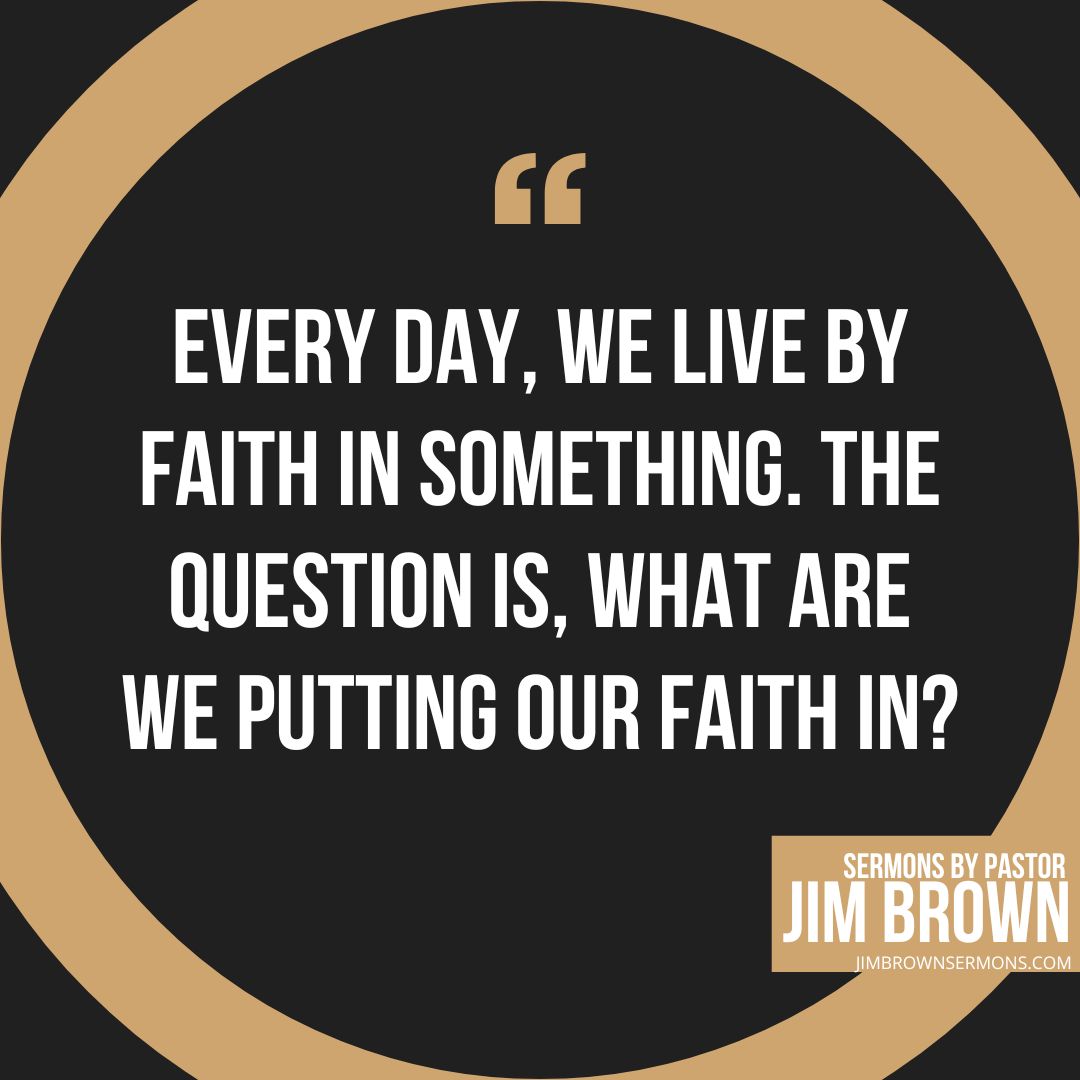
Trusting God Instead of Relying Solely on Conventional Means
“But if any of you lacks wisdom, let him ask of God.” – James 1:5-
Our natural inclination is to rely on conventional means—financial security, stable jobs, relationships. Yet Biblical Faith looks to God first, trusting in His provision over all else. James 1:5-8 encourages us to seek wisdom from God, asking in faith without doubting.
Walking by faith means trusting God’s guidance above our own plans, especially in difficult situations. As we grow in faith, we begin to turn to God as our primary source, learning to lean on Him fully.
Growing in Biblical Faith: Overcoming Assumptions
To grow in Biblical Faith, we must let God challenge our assumptions. Faith encourages us to reexamine the beliefs that hold us back, prompting growth. 2 Peter 1:5 tells us to “apply all diligence” in developing our faith with virtues that reflect God’s character.
As God reshapes our assumptions, our faith becomes a stronger part of who we are. This journey deepens our trust in Him, helping us become more consistent in walking by faith.
Resting in Faith That Pleases God
Resting faith provides us with assurance in God’s promises. Hebrews 11:1 describes faith as “the assurance of things hoped for.” Faith that pleases God offers a deep peace, even amid life’s challenges.
A faith that’s resting in God is one that doesn’t shift with circumstances. It’s an unshakeable faith that remains steadfast, anchored in the knowledge of God’s unfailing character.
Renewing Our Minds: Living Out Biblical Faith
“And do not be conformed to this world, but be transformed by the renewing of your mind.” – Romans 12:2
Living out Biblical Faith requires a continual renewal of our minds, aligning our thoughts with God’s truth. Romans 12:2 challenges us to be transformed by God, moving away from worldly thinking and embracing His perspective. Through this transformation, we discern God’s will and live a life that mirrors His values.
As we mature in faith, our lives reflect His ways more than societal norms. True Biblical Faith combines trust and obedience, bringing us closer to God and aligning us with His purpose.

Practical Steps in Walking by Faith Every Day
Growing in faith involves several steps:
- Discovering Truth: Understanding who God is and His promises.
- Experiencing Truth: Allowing faith to guide our choices and actions.
- Assimilating Truth: Making faith a natural part of our identity.
A life walking by faith involves trusting God’s timing, surrendering control, and letting Him shape our path. When we live by faith, we see God working in every area, transforming us and revealing His purpose.
Choosing Biblical Faith Over Comfort
Faith that pleases God resists the world’s pull toward comfort, instead embracing a life of trust in Him. Living by Biblical Faith is not always easy, but it brings lasting joy and peace. As we trust God and follow His Word, we grow in faith, experiencing a life that’s rooted in hope and purpose.
Ultimately, walking by faith is a choice that leads us on an incredible journey with God, one marked by peace, trust, and the assurance of His presence in every step.
Conclusion: Embracing Faith That Pleases God
Embracing Biblical Faith and walking by faith daily leads us closer to God, transforming our lives for His glory. This faith invites us to a life of peace and rest, grounded in God’s promises and trustworthiness.
Original Sermon Date June 19, 2005
© 2024 Sermons by Pastor Jim Brown www.jimbrownsermons.com All rights reserved.
RECENT SERMONS
Ep 19: IT’S ALL DOWNHILL FROM HERE | Submit to God for Real Freedom
Ep 18: THINKING BACK LOOKING AHEAD | God’s Love Never Fails
Find hope in the midst of uncertainty as this sermon reveals how God’s love, mercy, and faithfulness remain steady—even when life doesn’t go as planned.
EP 17: WE NEED A KING | Finding True Security in God
Feeling lost and insecure? True security in God comes from trusting Him completely. Learn how seeking God brings peace and strength.
EP 16: WHAT ARE YOU DOIN’?! | Trusting God’s Plan Changes Everything
When life feels uncertain, trusting God’s plan changes everything. See how His faithfulness, redemption, and promises lead to true victory in Christ.
EP 15: WHO’S NEXT | How to Truly Love God with All Your Heart
Loving God isn’t just a feeling—it’s a way of life. True love for God starts with action. It’s about trusting God fully, following His commandments, and surrendering your heart completely. Learn how to align your heart, mind, and actions with His commandments and grow in faith like never before.
EP 14: GOOD ENOUGH ISN’T GOOD ENOUGH | The Truth About a Relationship with God
Is ‘good enough’ really enough? A true relationship with God isn’t about rules—it’s about faith, obedience, and trust. Listen now to grow in Biblical faith!


